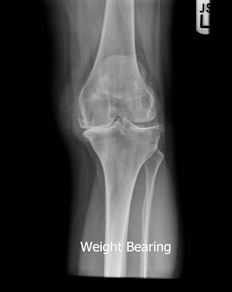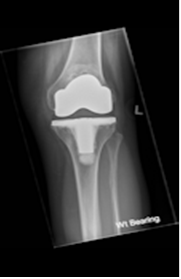- Reference Number: HEY469/2020
- Departments: Orthopaedics
- Last Updated: 31 May 2020
Introduction
This leaflet has been produced to give you general information about your Total Knee Replacement. Most of your questions should be answered by this leaflet. It is not intended to replace the discussion between you and your doctor, but may act as a starting point for discussion. If after reading it you have any concerns or require further explanation, please discuss this with a member of the healthcare team.
What is a total knee replacement?
Total knee replacement operation is a procedure that removes the worn out cartilage in an arthritic knee and replaces it with an artificial joint made of metal parts separated by a plastic spacer. The metal parts are usually fixed to the bone with special cement, as demonstrated in the X-ray pictures below. The operation takes between one and a half to two hours but you will be in theatre longer to allow for recovery from the anaesthetic.
Pre-operative X-ray of an arthritic knee

Copy of an X-ray used to illustrate total knee replacement with kind permission from a patient.
Post-operative X-ray of a knee replacement

Copy of an X-ray used to illustrate total knee replacement with kind permission from a patient.
Why do I need a total knee replacement?
You have been offered a knee replacement to relieve the pain you have in your knee and improve your function, as other methods of improving it have not succeeded (pain relief, anti-inflammatory medications, exercise, walking sticks etc.).
What are the results of total knee replacements?
Following surgery, the pain and stiffness from your knee should gradually improve. The majority of patients are able to increase their activity over time (months). Just over 80% of patients who have a knee replacement are happy with the results and are pleased they have had it done even if they have some residual aches in their leg; they feel that the surgery has improved their quality of life. Only a minority (5 – 10%) have lingering symptoms or are unhappy with the outcome for a variety of reasons particularly if a complication has occurred.
Patients with an increased risk of complications include those with pre-existing medical conditions such as diabetes, high blood pressure, high cholesterol, heart disease or stroke; smokers and overweight patients are also at an increased risk. If needed, we try to decrease the risks by improving your general health prior to surgery with the help of your doctor, other specialists and the pre-assessment clinic but we cannot eliminate them completely.
Can there be any complications or risks?
The following are some of the risks and possible complications following a total knee replacement. This is not a full list of all the possible complications but are the more common or serious ones.
Risks of a total knee replacement
There are risks when you have general anaesthesia. Please discuss these risks and how they apply to you with your anaesthetist or surgeon.
- Clots in legs / lungs DVT / PE (Thrombosis)
Because of your surgery, you are more likely to have a Deep Vein Thrombosis (DVT), or a blood clot forming in the veins. This happens in 1 in 5 patients unless precautions are taken e.g. use of special stockings, medication and early movement of your leg. Unfortunately a small number of patients may still get a DVT, and this can lead to long term swelling and skin problems. The greater danger is that in 1-2% of patients the clot in the leg can travel to the lungs a condition called Pulmonary Embolus (PE), which can lead to death in 1 patient in 3000. - Infection
Risk of wound infection is decreased by giving you antibiotics at the time of surgery and immediately after. If it occurs, it can be superficial (2 in 100 – easier to treat) or deep in the joint replacement (6 in 1000, more difficult to treat). Infection can occur at any time after surgery (days or years) and can lead to the knee replacement failing. If this happens, you will need further surgery to your knee such as revision or fusion (so that the knee would not bend at all). In extreme cases infection can result in above knee amputation or death. Infection can also occur in your chest or urinary tract (waterworks) which could lead to infection in your knee. - Nerve or blood vessel damage
As a result of surgery you should expect numbness to a varying degree around your knee. This is because the surgery involves cutting the small skin nerves around the wound. More rarely, the blood supply (0.1%) or the nerves (1%) which allow you to feel or move your leg, may get damaged resulting in discolouration of your whole leg, changes/disturbance in the temperature of your leg, weakness of your leg/foot, severe numbness or pain. To help you, you may be offered surgery to the vessels behind the knee. In extreme cases, damage to the nerves or vessels may lead to above knee amputation or death. - Complex regional pain syndrome (CRPS)
In some patients, complex regional pain syndrome can occur after surgery for unknown reasons. This is managed in the pain clinic. - Strokes, heart attack or heart failure
Heart attack and heart failure can occur without surgery. They can also happen while you are in the hospital and the stress of surgery can increase the chance of such an event. - Wear / loosening
With time the knee will wear out (vast majority last well over 10 years) and you might require another knee replacement (revision) which may not last or be as good as a well-functioning first knee replacement. - Bone breakage / fractures; dislocation, pain from the knee cap (patella)
These can occur during surgery or at any stage in your life. Depending on your age and the type of the problem you may be offered further surgery e.g. a fixation, replacement, patella button, or in extreme cases an above knee amputation. Ligament injury occurs in approximately 2% of cases. - Knee stiffness
This may cause difficulties in walking or sitting. You can help prevent it by working hard on your exercises, even if it is uncomfortable, and you may need extra physiotherapy. Some patients require another anaesthetic to manipulate the knee and break down scar tissue.
How do I prepare for the total knee replacement?
Please read the information leaflet. Share the information it contains with your partner and family (if you wish) so that they can be of help and support. There may be information they need to know, especially if they are taking care of you following this examination.
Should I or should I not have the operation?
Total Knee Replacement is only considered when other alternatives of treating your arthritis (e.g. pain medication, injections, physiotherapy and other measures) have failed in managing your symptoms. If you do not wish to have a knee replacement, you do not have to. You can continue to treat your knee arthritis with pain killers, modifying your activity and accepting your pain. It is a personal decision which you make depending on how bad your pain is, how it disrupts your lifestyle and how much you can put up with it. However, your arthritis may get worse with time and increase the pain from your knee. This may lead to a loss of independence in activities like walking, shopping, climbing stairs, getting out of a chair, etc. It is also possible that your arthritis and pain may not change in severity in any significant manner.
If you choose not to have an operation at this stage you can always have it later when you feel that your condition warrants it, providing that you remain well otherwise.
What will happen?
Before admission (usually about 2-3 weeks) you will receive an appointment for pre-assessment. This takes place at Castle Hill Hospital. You will have a series of tests and a nurse will discuss your admission and any particular needs you might have. You will also see a physiotherapist as part of our “Joint School”, to advise on exercises to perform before surgery and to explain how you are helped to mobilise afterwards.
If any medical problems arise between pre-assessment and admission, please contact the ward to check that surgery can still go ahead; for example if you are unwell or if any skin problems arise (e.g. cuts, spots etc.).
Most patients are admitted on the day of surgery but a few are admitted on the evening before. The surgery takes place at Castle Hill Hospital – your ward will be shown on your admission letter. Please take particular note of instructions in the letter regarding the latest time you can eat or drink before surgery; this is very important.
The surgeon and anaesthetist will visit you before the operation.
The anaesthetist will discuss possible options which may include general or spinal anaesthesia, together with post-operative pain management. A significant number of patients undergoing total knee replacement will have a local anaesthetic drug injected through a needle into the small of the back to numb the nerves from the waist down to the toes for two to three hours (a spinal anaesthetic). This sort of anaesthetic reduces the need for strong morphine pain relief during the operation and means that when you recover after the operation your pain should be under control. In addition, your knee joint is also usually injected with a combination of pain relieving medication at the time of operation which will ease your pain soon after surgery. This will enable you to be mobilised early by doing some gentle walking on the same day as your operation in many cases. Mobilising early has been shown to reduce the time that patients stay in hospital, the need for blood transfusion and reduce risks.
We will do our best to control your pain as much as possible without putting you at risk. Further details will be available to you in the pre-assessment clinic.
You will usually be in hospital for 2 to 5 days depending on several factors (age, how well motivated you are, physiotherapy, your social circumstances etc).
What happens afterwards?
Recovery from surgery
There are things which you should expect following knee replacement surgery. These include: numbness around the knee; swelling for several months; residual aches in the leg or knee; kneeling will not be possible for many patients and there might be bruising in the early weeks after surgery. There is a chance you will feel some pain at the site of the operation. Remember that the function of your knee replacement will improve for several months following surgery.
Looking after your new knee
- Avoid gaining weight
- Be careful in slippery conditions or uneven areas to avoid falls particularly on boats, pools, rivers, steps etc
- Regular walks will help to keep you mobile
- See your doctor for early treatment if you develop infections in your chest, urinary tract or elsewhere
Please do not hesitate to discuss the operation with your consultant, members of the team, your own doctor or family / friends before making your final decision. Remember you can always change your mind about having an operation without offering an explanation.
For more information you can look at the following web sites/addresses:
http://orthoinfo.aaos.org/topic.cfm?topic=A00389
http://orthopedics.about.com/od/hipkneereplacement/tp/kneereplacement.htm
https://www.nhs.uk/conditions/knee-replacement/
https://www.versusarthritis.org/about-arthritis/treatments/surgery/knee-replacement-surgery/
Should you require further advice on the issues contained in this leaflet, please do not hesitate to contact the Orthopaedic Department, via your consultant’s secretary. tel: 01482 675181.
General Advice and Consent
Most of your questions should have been answered by this leaflet, but remember that this is only a starting point for discussion with the healthcare team.
Consent to treatment
Before any doctor, nurse or therapist examines or treats you, they must seek your consent or permission. In order to make a decision, you need to have information from health professionals about the treatment or investigation which is being offered to you. You should always ask them more questions if you do not understand or if you want more information.
The information you receive should be about your condition, the alternatives available to you, and whether it carries risks as well as the benefits. What is important is that your consent is genuine or valid. That means:
- you must be able to give your consent
- you must be given enough information to enable you to make a decision
- you must be acting under your own free will and not under the strong influence of another person
Information about you
We collect and use your information to provide you with care and treatment. As part of your care, information about you will be shared between members of a healthcare team, some of whom you may not meet. Your information may also be used to help train staff, to check the quality of our care, to manage and plan the health service, and to help with research. Wherever possible we use anonymous data.
We may pass on relevant information to other health organisations that provide you with care. All information is treated as strictly confidential and is not given to anyone who does not need it. If you have any concerns please ask your doctor, or the person caring for you.
Under the General Data Protection Regulation and the Data Protection Act 2018 we are responsible for maintaining the confidentiality of any information we hold about you. For further information visit the following page: Confidential Information about You.
If you or your carer needs information about your health and wellbeing and about your care and treatment in a different format, such as large print, braille or audio, due to disability, impairment or sensory loss, please advise a member of staff and this can be arranged.

